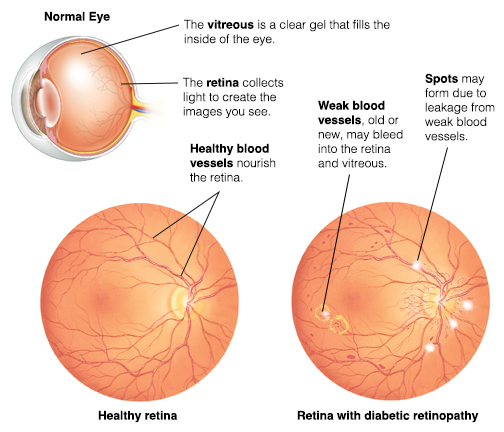What Is Diabetic Retinopathy?
Diabetic retinopathy is the main cause of blindness in adults. It happens when diabetes harms blood vessels in the eye. These weak vessels leak fluid into a part of the eye called the retina. New blood vessels can break and bleed into the retina. Old blood vessels can leak and cause swelling. These vessels can damage parts of the retina. This can cause blurry, distorted vision.

What causes diabetic retinopathy?
Diabetes is the cause of this eye disease. Over time, diabetes weakens blood vessels all over the body, even in the eyes. Poor blood sugar control can make it worse. So can:
-
Smoking
-
High cholesterol
-
High blood pressure
-
Pregnancy
This health problem happens more often in Hispanics and African Americans and in those with a family history.
What are the symptoms?
You can have diabetic retinopathy without knowing it. It often affects both eyes. There is often no pain and no outward sign. Over time, you may notice blurring or some vision loss. Some people have trouble seeing at night. Or they may see spots or floaters. Symptoms may come and go. Early treatment and good control of risk factors are key. They may help prevent vision loss or blindness.
What can you do?
Have your eyes checked at least once a year by an eye specialist. Your healthcare provider will tell you when and how often you need these exams. You can also help control your diabetes by:
If you already have diabetic retinopathy, these same steps may help you control it, too. But don't do exercises that raise your blood pressure quickly. This includes exercises that involve heavy lifting, holding your breath, or straining.
Online Medical Reviewer:
Chris Southard RN
Online Medical Reviewer:
Rajadurai Samnishanth Researcher
Online Medical Reviewer:
Rita Sather RN
Date Last Reviewed:
3/1/2024
© 2000-2024 The StayWell Company, LLC. All rights reserved. This information is not intended as a substitute for professional medical care. Always follow your healthcare professional's instructions.